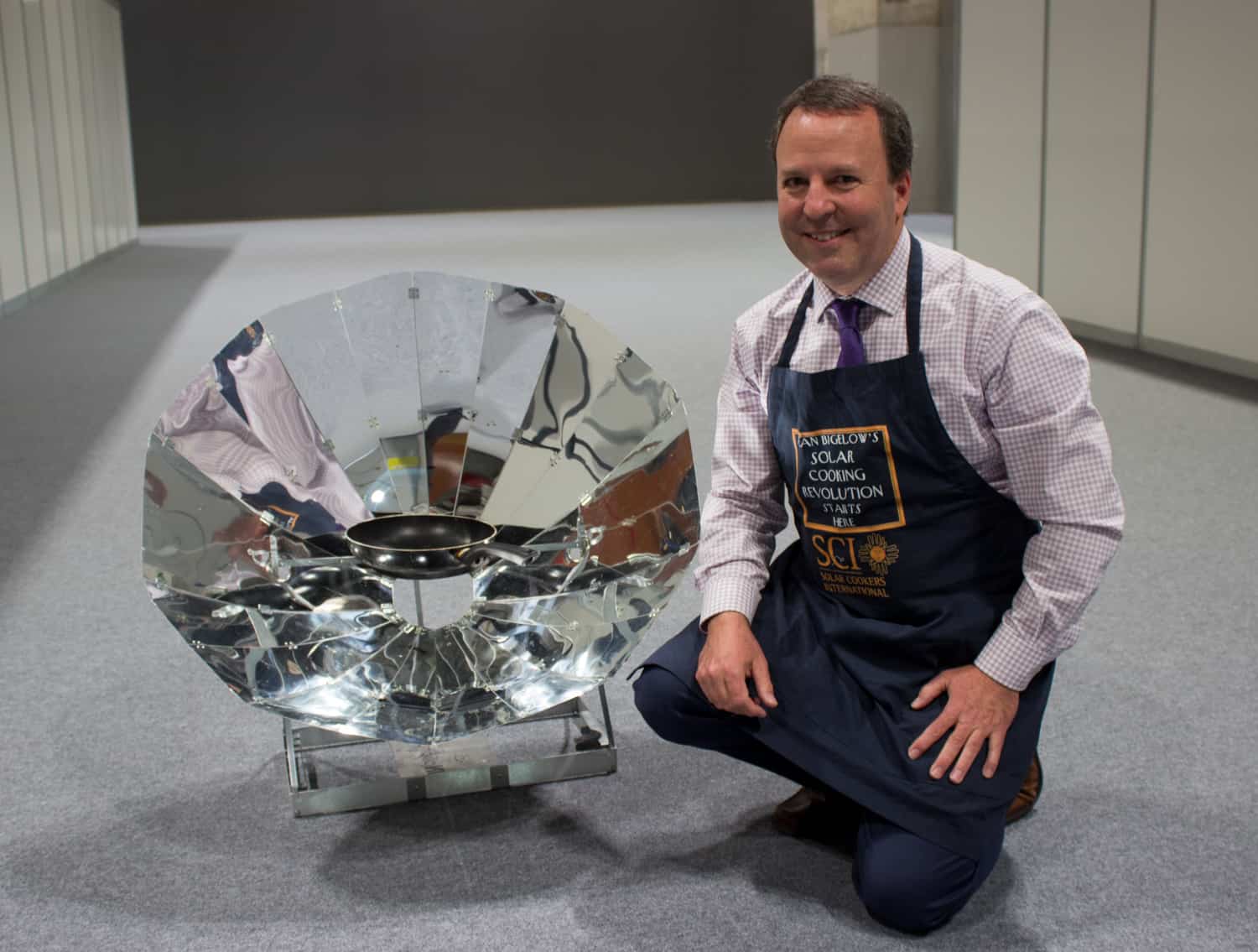
“Concentrate all of your thoughts upon the work at hand. The Sun’s rays do not burn until brought to a focus.” That’s a quote from the great inventor Alexander Graham Bell, emphasizing that technological breakthroughs don’t happen without hard work and concentration.
It seems the US physicist Alan Bigelow has taken Bell’s advice quite literally, in becoming a leading advocate for solar cooking – a way of heating food by focusing the Sun’s rays onto cookware. Bigelow is the science director of Solar Cookers International (SCI), a non-profit organization that researches and promotes solar cooking, while building its capacity across the world. In December Bigelow and SCI colleagues were at the UN climate summit in Madrid (COP 25) speaking about the technology’s potential, especially in developing countries.
Coming in different shapes and sizes, solar cookers directly harness thermal energy from focused sunlight. They feature silvered surfaces that reflect sunlight onto blackened surfaces, which then efficiently absorb the heat. So-called “panel” and “parabolic” varieties focus the heat directly onto cookware, whereas the “box oven” includes an insulating chamber – making them useful for baking.
SCI provides guides for communities to build their own cookers and advocates the use of local materials where possible. “A solar cooker is a very simple device, this is what you would call appropriate technology, not high technology, not necessarily low technology,” said Bigelow.
The key intended users of solar cookers are the nearly 3 billion people who currently cook over stoves and open fires that use wood, animal waste or charcoal as fuel. Mainly based in rural areas in the developing world, these people are inhaling smoke and soot, which can lead to a range of health problems. Some end up spending a large chunk of their income on fuel, while those searching for wood and other natural fuels can put themselves in danger, especially women who can be at risk of gender-based violence.
According to SCI figures, there are currently more than 3.7 million solar cookers worldwide, used by 13.4 million people, providing an estimated 7 billion meals. Part of the reason SCI attended COP 25 was to highlight the associated climate benefits of solar cooking, given that it produces no air pollution and zero greenhouse-gas emissions. Eliminating the need for fuel also helps to reduce deforestation.
A solar cooker is a very simple device, this is what you would call appropriate technology, not high technology, not necessarily low technology
Alan Bigelow
Bigelow himself has an interesting background. Part of his childhood was spent in west Africa in the Republic of Upper Volta (now Burkina Faso). He went on to do a physics doctorate at the University of North Texas before working at Colombia University Medical Center where he developed technology for radiation-biology studies. Bigelow says that upon first encountering a solar cooker in 2008, he immediately saw both the physics potential and the humanitarian impact it could have in some of the communities he experienced in Africa.
“From the physics side, I have to say there’s a lot of common ground between what I’m doing now and my work with particle accelerators and lasers, because we were managing light energy.”
Now based in New York where he regularly demonstrates solar cooking in outreach events, Bigelow is SCI’s main representative to the United Nations. SCI attends events such as COP 25 to forge partnerships with local organizations and government representatives. For instance, SCI recently collaborated with the Kenyan organization Ecomandate Foundation to provide solar cookers for Kakuma refugee camp in the north of the country. Established in 1992, the camp now has more than 190,000 registered refugees and asylum-seekers, many of whom rely on wood and charcoal stoves.
SCI’s executive director, Caitlin Hughes, says that the power of solar cooking is its ability to address multiple and interconnected global issues including environment, health and equality. “We are encouraging countries to include solar cooking in their plans to address climate change,” she said. “It positively impacts all 17 of the United Nations’ sustainable development goals.”
Hughes and Bigelow will be featured in an upcoming episode of the Physics World Weekly podcast. In the meantime, you can see how a solar cooker is assembled by watching the video above.



